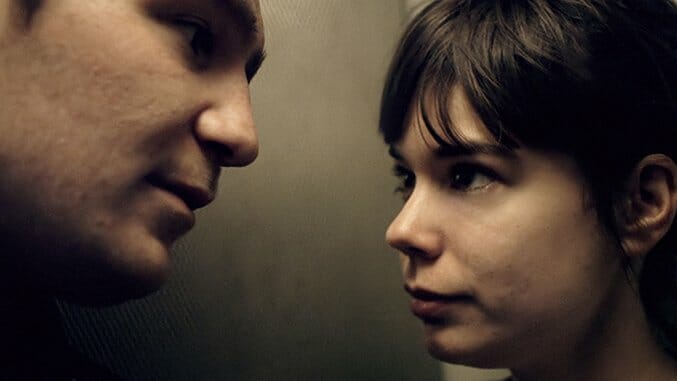An experiment, a lark, an invitation to think about the very mechanics of how we process movies—Victoria may not, much like its main characters and their bank-heist scheme, get away clean with its audacious stunt. But at a time when it’s hard to give audiences a genuinely unique viewing experience, this one-take German drama-thriller stands apart. Where other movies like Rope or Birdman artfully hid their cuts to give the illusion that their stories were happening in real time, director and co-writer Sebastian Schipper’s fourth feature works without a net, its two-hour-plus journey through the early morning hours of Berlin growing increasingly more suspenseful, his camera capturing every moment.
The film stars Laia Costa as Victoria, a young woman from Madrid dancing the night away at a Berlin club. Taking a breather, she meets Sonne (Frederick Lau), a local who seems about two steps up the evolutionary ladder from street thug. He and his buddies (Franz Rogowski, Burak Yigit, Max Mauff) are drunken, probably horny oafs, and there’s an initial anxiety in the viewer when they convince her to hang out with them. A petite, trusting woman, Victoria leaves the safety of the club and goes out into the night with these affable hooligans—because, c’mon, you’re only young once.
Schipper, working with cinematographer Sturla Brandth Grøvlen, has spoken about being intrigued by the high-wire riskiness of his single-take strategy, but the way it often plays out in Victoria, the handheld camera that follows our main characters reflects the giddy, loose-limbed casualness of lives not yet fully formed, made up as they go along. The nervous flirtation between Sonne and Victoria, the improvised plans hatched impromptu in order to keep extending the night: Victoria has all the restless energy inherent in the pursuit of a good time, the late hour creating both exhaustion and exhilaration, as well as teasing the possibility that anything could happen.
In such an environment, though, tedium can also flourish. During Victoria’s first hour, Schipper intentionally keeps things rambling while Victoria and the boys wander around in search of fun. (They steal some booze from a convenience store; they hang out on a rooftop; etc.) Not much more happens than the normal bull sessions and get-to-know-you chitchat that are crucial to a well-balanced twentysomething social diet. But the filmmaker lets the empty predawn streets always hint at something more ominous, playing into our fears about a young woman in a strange city possibly being at the mercy of young men whose full intentions aren’t clear.
Eventually, Victoria reveals its narrative twist: Sonne and his buddies have to pay back a debt by orchestrating a bank robbery for a shadowy underworld figure. And when one of the pals becomes too drunk to assist in the heist, Victoria is coaxed into filling in as the getaway driver, although Sonne doesn’t explain what they’re up to until it’s too late for her to back out.
There’s no denying Victoria’s technical achievement. It’s not simply that Schipper executes a single-take film, it’s that he navigates between disparate genres and locations to create a coherent, gripping drama with a rollicking confidence. One never quite forgets the gimmick tying the film together, but then again, Victoria derives part of its pleasure from the acknowledgement of the strings being pulled.
That unabashed artificiality juxtaposes (sometimes awkwardly) with Victoria’s notion of realism that the handheld camera and single-take strategy seek to evoke—for example, the introduction of the heist plot feels completely arbitrary—but despite some tonal problems, the movie is instructive in making us ponder how we normally interact with a film, how the standard cuts between scenes create a pause or trigger a mental refocusing. Victoria doesn’t have a headlong rush story-wise (although it does ramp up considerably after the heist) but its formal construction elicits a certain breathless quality regardless, relying on the actors to shift between moods without any breaks. And without the cuts, the movie can feel tiring, as if it’s forcing us to stretch an underused muscle in order to build up our conditioning.
But if Victoria works best as a playful intellectual and technical exercise, the movie also delivers plenty of the old-fashioned pleasures in performance and suspense. As you might guess, the gang’s heist doesn’t go off without a hitch, leading to a frantic chase and shootout in which not everyone will escape alive. Schipper saves the finest bravura touches for Victoria’s final sequences, in which the seemingly demure Victoria will face a series of harrowing choices. Costa is understated in her portrayal, showing us a young woman innocently out for the night who discovers something untapped within herself by the time the sun comes up the next day. Though Victoria is destined to be remembered for Schipper’s nerve, his titular star supplies the film with its heart and guts.
Director: Sebastian Schipper
Writers: Sebastian Schipper, Olivia Neergaard-Holm, Eike Schulz
Starring: Laia Costa, Frederick Lau, Franz Rogowski, Burak Yigit, Max Mauff
Release Date: October 9, 2015
Tim Grierson is chief film critic for Paste and the vice president of the Los Angeles Film Critics Association. You can follow him on Twitter.
